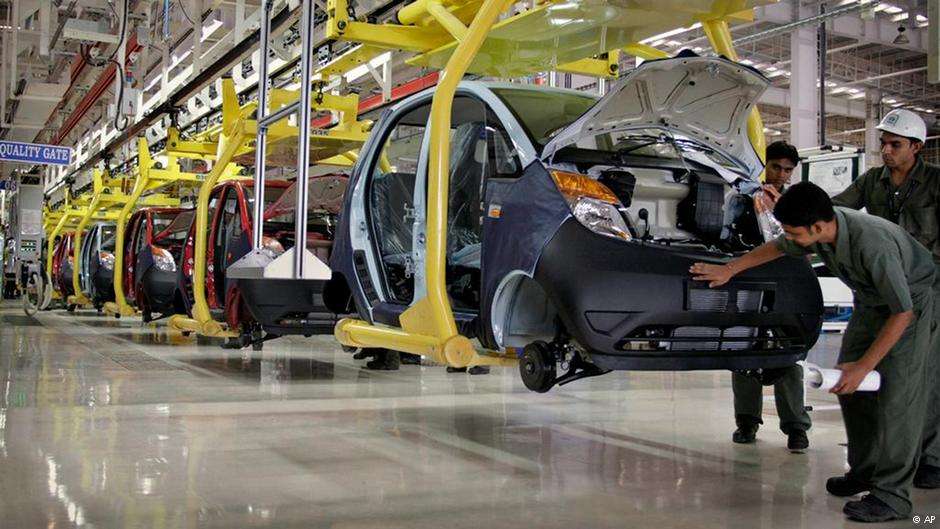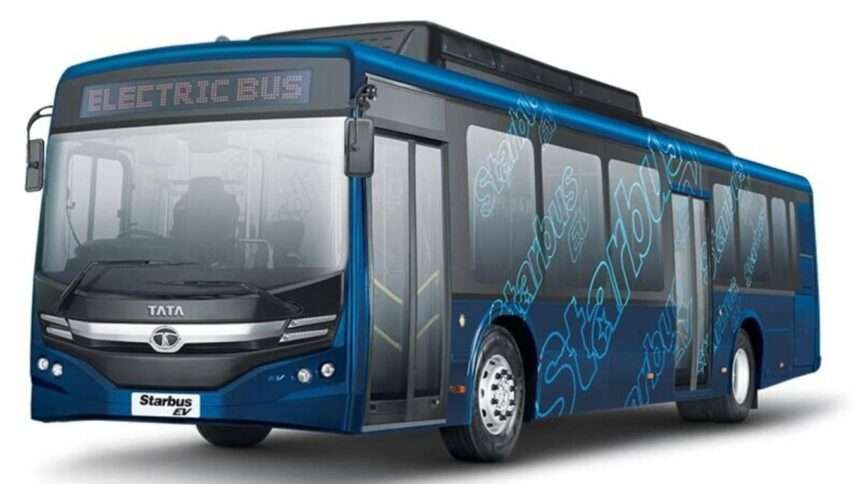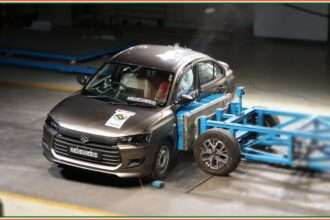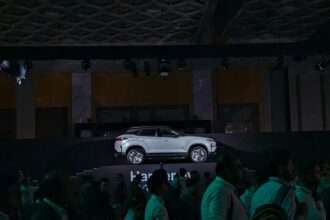In a world where innovation drives progress, Tata Motors steps boldly into the future with the unveiling of the Ultra EV 7M. This latest addition to their impressive lineup signifies a major leap in sustainable public transport, aligning perfectly with Tata’s commitment to digital transformation. As part of the global Tata Group, this move reflects their dedication to providing cutting-edge products and services that redefine mobility in India and beyond. Discover how Tata is shaping the future of communications and information technology in the automotive industry.
1. Introduction: The Importance of Sustainable Public Transport
Tata Motors’ Ultra EV 7M represents a significant advancement in sustainable public transport, showcasing the company’s commitment to innovation. As urban areas continue to expand, the need for environmentally friendly transportation solutions becomes increasingly vital. Tata, as part of its broader strategy, leverages cutting-edge digital technologies and cloud communications to enhance the efficiency of its services. This global group, with deep roots in India, aims to transform public transit through electric vehicles that not only reduce emissions but also streamline operational costs. The Ultra EV 7M’s design focuses on optimizing passenger comfort while ensuring reliability and performance. In July, Tata revealed its new electric bus lineup, emphasizing the integration of smart information systems and sustainable materials such as advanced steel. This aligns with Tata’s vision for a greener future, and underscores how they continually adapt to market needs while setting industry standards through innovative products and services. The future of urban mobility looks promising with Tata Motors leading the charge.
2. Tata Motors: A Leader in Electric Vehicle Innovation
Tata Motors is at the forefront of electric vehicle innovation, continuously transforming the landscape of sustainable transportation. As a global leader, the company leverages advanced technology and cloud-based solutions to develop products that meet the growing demand for eco-friendly public transport. The Ultra EV 7M exemplifies Tata’s commitment to integrating digital advancements into its offerings, ensuring efficient communication and operation within urban environments. This innovative vehicle stands not only as a transportation solution but also as a testament to Tata’s vision for a greener future. With a robust framework supported by Tata Consultancy Services (TCS), the company harnesses valuable information and insights to optimize its strategies. The launch of the Ultra EV 7M in July marks a significant milestone in India’s quest for sustainable public transport. By aligning its business approach with environmental goals, Tata Motors reinforces its position as a pioneer in the electric vehicle sector, inspiring other companies to follow suit in the global transition toward cleaner mobility solutions.
3. Overview of the Ultra EV 7M
The Ultra EV 7M represents a significant leap forward in public transportation, showcasing Tata’s innovative spirit and commitment to sustainability. This electric bus is designed with modern urban needs in mind, integrating cutting-edge technology to enhance the passenger experience. Through its advanced cloud-based communication systems, the Ultra EV 7M ensures seamless connectivity for both operators and commuters. Tata’s dedication to providing eco-friendly solutions is evident in the bus’s energy-efficient design, which not only reduces emissions but also lowers operational costs. As India’s leading automotive manufacturer, Tata Motors leverages its extensive global presence and robust business model to introduce products that reflect a sustainable future. The Ultra EV 7M is more than just a vehicle; it embodies Tata’s vision for transforming urban mobility through innovative services and digital advancements. By investing in electric vehicles, Tata is poised to make a meaningful impact on public transport, ultimately aligning with a global push towards greener cities.
4. Key Features of the Tata Ultra EV 7M
The Tata Ultra EV 7M represents a remarkable advancement in sustainable public transport, showcasing a range of innovative features designed to enhance urban mobility. This electric bus is equipped with cutting-edge battery technology, ensuring long-range capabilities and reduced charging times, which are vital for efficient daily operations. Its spacious interior offers comfort for passengers, while the smart digital interface facilitates seamless communication and information sharing. Additionally, Tata’s commitment to utilizing eco-friendly materials in the bus construction underscores its dedication to sustainability. The lightweight steel frame not only boosts performance but also contributes to improved energy efficiency. With Tata’s global experience and expertise in vehicle design, the Ultra EV 7M stands out as a testament to the company’s vision of revolutionizing public transportation. By integrating advanced technology and sustainable practices, Tata is not only addressing urban transport challenges but also playing a significant role in reducing the carbon footprint of cities worldwide. Such innovations define the future of transportation in India and beyond.
5. Benefits of Electric Buses for Urban Environments
Electric buses, such as the Tata Ultra EV 7M, represent a remarkable shift in urban transport. Their deployment significantly reduces harmful emissions, addressing the pressing need for cleaner city air. The Tata Group’s commitment to sustainability is reflected in this innovative vehicle, which combines advanced technology with eco-friendly practices. By leveraging digital communications and cloud-based solutions, Tata ensures that the Ultra EV 7M integrates seamlessly into existing public transport systems. This not only enhances operational efficiency but also provides real-time information to passengers, improving their overall experience. Furthermore, as cities worldwide adapt to the challenges of urbanization, the adoption of electric buses will enable them to meet growing transportation demands without compromising environmental standards. Tata’s leadership in this sector showcases a forward-thinking approach that prioritizes both business viability and environmental responsibility. As we look toward a more sustainable future, the benefits of these electric buses become ever clearer, promising a greener and smarter urban landscape for all.
6. Tata’s Commitment to Environmental Sustainability
Tata Motors is at the forefront of integrating sustainability into its business model, demonstrating a steadfast commitment to environmental care. This commitment is reflected in their innovative approach to electric vehicles, such as the Ultra EV 7M, which embodies the company’s dedication to reducing carbon footprints in urban transport. By leveraging advanced digital technologies and cloud-based solutions, Tata aims to optimize its operations and enhance communication within the global market. The company’s diverse portfolio of products and services not only supports the transition to electric mobility but also emphasizes the importance of sustainable practices in the steel industry and beyond. As Tata continues to discover new avenues for growth, its initiatives foster a culture of responsibility and awareness about climate change. With a strong foundation rooted in India’s industrial landscape, Tata Motors stands poised to lead the charge toward a greener future while inspiring other sectors to adopt similar environmentally friendly strategies.
7. The Role of Government Policies in Promoting Electric Vehicles
Government policies play a significant role in the advancement of electric vehicles, particularly in India, where Tata Motors is leading the charge with its innovative Ultra EV 7M. Supportive regulations and incentives encourage both manufacturers and consumers to embrace sustainable transportation solutions. In July, various initiatives aimed at reducing emissions and promoting cleaner public transport were introduced, enhancing the appeal of electric buses. The Tata Group, recognized for its commitment to sustainability, utilizes its extensive experience in digital communication and cloud technology to streamline operations within its EV division. This strategic approach not only bolsters Tata’s market position but also aligns with global trends toward green mobility. By prioritizing environmental considerations and investing in cutting-edge products and services, Tata Motors is setting a benchmark for other companies in the industry. The collaboration between government entities and businesses like Tata can accelerate the transition to electric vehicles, ensuring a cleaner and more efficient urban landscape for future generations.
8. Case Studies: Successful Implementation of Tata Electric Buses
Tata Motors is pioneering the electric bus landscape, showcasing its commitment to sustainable public transport through successful implementations of the Ultra EV 7M. By leveraging advanced digital technologies and cloud-based solutions, Tata has managed to enhance operational efficiency and provide real-time information to fleet operators. Various cities across India have reported significant reductions in emissions and operational costs after integrating Tata’s electric buses into their public transport systems. Notably, case studies demonstrate improved commuter satisfaction, linking Tata’s innovation with a positive user experience. The company’s strategic focus on environmental sustainability not only aligns with global green initiatives but also positions Tata as a leader in the electric vehicle market. With robust support from Tata Consultancy Services (TCS), the group’s emphasis on cutting-edge communication technologies amplifies its impact. As news of these successful projects spreads, more urban centers are likely to discover the advantages of switching to electric solutions, paving the way for a greener future in transportation.
9. Future Prospects for Tata Motors in the EV Market
Tata Motors is poised to redefine the future of electric vehicles, particularly in the public transport sector. As a leader in innovation, the company continually explores advanced technologies that integrate digital solutions to enhance efficiency and sustainability. The global push for cleaner transportation aligns perfectly with Tata’s strategy, leveraging the capabilities of Tata Consultancy Services (TCS) for data-driven insights. These enable Tata Motors to optimize its fleet management and improve overall service delivery. By investing in smart communications and cloud technologies, Tata aims to streamline operations and reduce downtime, ensuring that their electric buses are a viable alternative for urban environments. The company’s commitment to producing eco-friendly products reinforces its status as a pioneer in the electric vehicle market. With a strong focus on sustainability and collaboration, Tata Motors is set to influence not just India’s transport landscape but also make significant strides in the global market, highlighting the vital role of innovative solutions in combating climate change.
10. Conclusion: Tata’s Vision for Sustainable Transportation Solutions
Tata Motors is paving the way for a transformative shift in public transport through the introduction of the Ultra EV 7M, setting a standard for sustainable urban mobility. This innovative electric bus not only showcases Tata’s commitment to environmental stewardship but also reflects the company’s strategic vision for the future of transportation in India and beyond. With advanced digital technologies and cloud-based solutions, Tata is enhancing its products and services to meet the evolving needs of modern cities. The Ultra EV 7M is designed to operate efficiently while minimizing carbon footprints, appealing to both city planners and commuters alike. As Tata expands its global footprint, it continues to leverage cutting-edge communications to ensure that information about this groundbreaking vehicle reaches a wide audience. The integration of sustainable practices within Tata’s operations underscores its dedication to a greener future, positioning the group as a leader in the electric vehicle market and fostering a positive impact on urban environments worldwide.
People also ask
Here you find questions from Google’s “People also ask”. Use them to expand your blog with relevant information.
What is Tata in India?

Tata is one of India’s largest and oldest conglomerates, with a diverse portfolio that spans multiple industries, including steel, automobiles, information technology, telecommunications, hospitality, and consumer goods. Founded in 1868 by Jamsetji Tata, the group has played a pivotal role in India’s industrialization and economic development. Tata Group is known for its commitment to ethical business practices, sustainability, and community welfare, which are integral to its corporate philosophy. The group encompasses more than 100 companies, with notable subsidiaries such as Tata Steel, Tata Motors, Tata Consultancy Services (TCS), and Tata Power. TCS, in particular, has gained international acclaim as one of the leading IT services firms globally. Tata Motors is recognized for manufacturing popular vehicles, including the Tata Nano, which was once touted as the world’s cheapest car. Tata’s influence extends beyond business; it is also renowned for its philanthropic initiatives, primarily through the Tata Trusts, which support education, healthcare, and rural development. The group’s commitment to innovation and social responsibility has solidified its reputation as a pillar of Indian industry and a model for corporate governance worldwide.
Why is Tata so famous?

Tata is renowned for its significant contributions to various industries and its commitment to ethical business practices. Founded in 1868 by Jamsetji Tata, the Tata Group has grown into one of India’s largest and most respected conglomerates, encompassing sectors such as steel, automotive, information technology, telecommunications, and hospitality. The company gained global recognition with iconic brands like Tata Steel, Tata Motors, and Tata Consultancy Services (TCS). Tata Steel is one of the world’s top steel producers, while Tata Motors is known for manufacturing the Nano, the world’s most affordable car, showcasing innovation in engineering. Tata’s commitment to corporate social responsibility has also elevated its reputation. The Tata Trusts, which hold a majority of the group’s shares, focus on a wide range of social initiatives, including education, health care, and rural development. This philanthropic approach has ingrained the company into the fabric of Indian society. Moreover, Tata’s commitment to sustainability and ethical business practices has garnered respect both domestically and internationally. The company’s emphasis on quality, innovation, and customer satisfaction further solidifies its status as a trusted brand worldwide, making Tata a household name.
What is the abbreviation for Tata?
Tata is commonly abbreviated as “TATA,” which stands for Tata Group, a multinational conglomerate based in India. Founded in 1868 by Jamsetji Tata, the group has diversified interests across various sectors, including steel, automobiles, information technology, telecommunications, and consumer goods. Tata Group is one of India’s largest and oldest industrial groups, with a significant global presence. The abbreviation “TATA” also refers to the Tata Trusts, which are among the largest philanthropic organizations in India. The trusts focus on various social initiatives, such as education, health care, and rural development, reflecting the group’s commitment to corporate social responsibility. Tata Group operates numerous well-known subsidiaries, including Tata Motors, Tata Steel, and Tata Consultancy Services (TCS), each contributing to the group’s reputation and influence in their respective industries. Overall, TATA symbolizes a legacy of innovation, ethical business practices, and social responsibility, making it a prominent name not only in India but also on the global stage. The group’s emphasis on sustainability and community development continues to shape its operations and brand identity.
Is Tata a big company?
Tata Group is one of the largest and most diversified conglomerates in India, with a presence in over 100 countries across six continents. Founded in 1868 by Jamsetji Tata, the company initially started as a trading firm. Today, it operates in various sectors, including steel, automobiles, IT services, consumer products, telecommunications, and hospitality, among others. Tata Steel, Tata Motors, Tata Consultancy Services (TCS), and Tata Power are some of its most recognized subsidiaries. TCS, in particular, is one of the largest IT services firms globally, contributing significantly to the group’s revenue and enhancing its reputation on the international stage. The group is known for its commitment to corporate social responsibility, investing in community development and sustainability initiatives. With a workforce of over 700,000 employees, Tata Group is a significant employer in India. Its revenue exceeds $100 billion, making it a vital player in the Indian economy. Moreover, Tata’s strong brand equity and global partnerships further solidify its position as a major corporation, not just in India, but also in the global market. Overall, Tata Group’s extensive operations and influence underscore its status as a big company.




